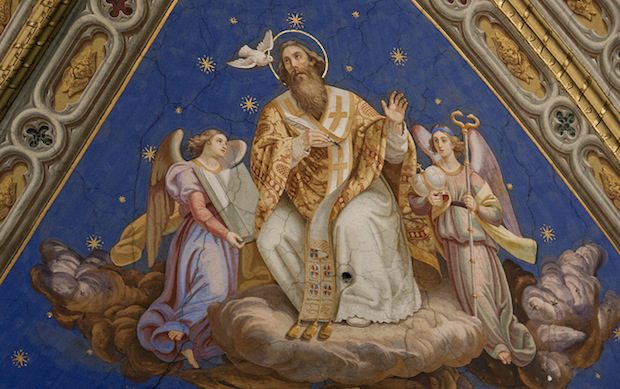Basil Meets the Benedict Option

So I’ve been reading historian Robert Louis Wilken’s terrific book The Spirit of Early Christian Thought, with the intention of learning how the early church lived and taught and thrived in a culture that was not yet Christian. This, to inform my thinking about the Benedict Option for my next book.
What I know about the early church is very, very little, so Wilken’s book is, no kidding, a real page-turner. (It helps that he’s a marvelous writer.) One thing that surprises and delights me is how stunningly close the way we worship in our little Orthodox mission here on the bayou is to the way the early church worships. I generally knew this was the case, but when you get right down to the nitty-gritty, a believer from the fourth century could walk in to our liturgy and know exactly what was going on. That is a humbling thought, at least to me.
Take, for example, St. Basil the Great (330-379), who spent the last nine years of his life as a bishop . He above all others would know where he was if he turned up in our parish this Sunday, because every Sunday during Lent, we celebrate the Divine Liturgy that he wrote.
Over lunch today, I was reading from Wilken’s book about St. Basil, and his teaching about Creation. Here’s a key excerpt:
Basil grew up in a large Christian family of five boys and five girls with deep Christian roots. His grandparents suffered during the persecutions at the beginning of the century, and one of his grandmothers taught the children sayings she had learned from the sainted Gregory the Wonderworker, a holy Christian teacher who had lived in the previous century. Such continuity within Christian families over several generations helped spark the flowering of Christian intellectual life in the late fourth century. As a recent student of Basil has observed, “Remarkably few of the well-known Christians of Basil’s generation leap onto the historical stage straight from a completely pagan milieu. Christians had been breeding Christians for a long time.”
Boom, there it is: the strategy for the Benedict Option. Christians have to play the long game, as our ancestors in the faith did. This is what I mean by the Benedict Option: to figure out how to live, and build the structures of community that make it possible to live, so that we raise generations of Christian families. Historical circumstances have trimmed back the previous growths of the faith down to the roots. Our job is to patiently tend the roots, and nurture them for the day when the long winter darkness ends.
UPDATE: Adam DeVille, who knows about such things, writes with a reproof that I appreciate:
Your claim that Basil would easily recognize liturgy in your parish today needs, to put it mildly, significant historical qualification. A fortiori so does your claim that he wrote the liturgy bearing his name. No serious scholar today would make that claim. The best historical scholarship, beginning with the doyen of such scholars, viz., Robert Taft, has recognized that the Basilian anaphora can reliably be attributed to him but beyond that far less can be claimed with any certainty.
Let me add too that I don’t read “breeding” as calling for Christians to out-gestate non-Christians. I take it that the writer meant that Christian families of the era had a way of keeping their children, and their children’s children, faithful.
UPDATE.2: And the next person who repeats the much-denied claim that the Benedict Option is about running off to the hills and building a compound to keep out all the impure people is going to get punched. Seriously, though, I am so tired of repeatedly denying this that I’m simply not going to publish any comments stating this untruth.
Subscribe for as little as $5/mo to start commenting on Rod’s blog.